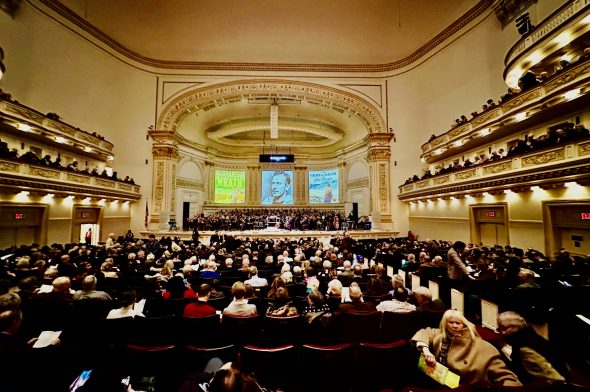Review: ‘The Grapes of Wrath.’ Steinbeck’s Okies Operatically Head to the Promised Land, Presented by MasterVoices
John Steinbeck’s American realist novel “The Grapes of Wrath” – the story, as every high school student in the United States knows, of the Joads, a poor family of tenant farmers driven from their Oklahoma home by drought, bank foreclosures, and human suffering – has fomented controversy since its publication on April 14, 1939 and little about that has changed.
Sixty-eight years after its publication, the story of the Joads became the basis of an opera by Ricky Ian Gordon and Michael Korie. Just as in the book, the Joads are poor folk of no particular note, made noble by both the desperation of their lives and their drive to survive, although many of them don’t.
The story was and continues to be viewed by some as communist propaganda, and it angered many farmers and agricultural groups who felt it painted them in a poor light. There are numerous religious overtones as well, starting with the title, which of course refers to the line: “He is trampling out the vintage where the grapes of wrath are stored in” from abolitionist writer Julia Ward Howe’s famous “Battle-Hymn of the Republic.”

The audience in the First Tier, Seecond Tier, Dress Circle, and Balcony sections seen from the stage
[Editor’s Note: Of course, aforementioned “grapes of wrath” have numerous biblical overtones starting with the Tanakh. In the Torah, specifically in בְּרֵאשִׁית, Bereshis, the first book of the bible, Chapter 49, verses 10 and 11, יַעֲקֹב, or Jacob, tells his 12 sons: “The scepter shall not depart from Judah, nor the student of the law from between his feet, until Shiloh comes, and to him will be a gathering of peoples. He binds his foal to a vine, and to a tendril [he binds] his young donkey. [He launders] his garment with wine, and with the blood of grapes binds his raiment.”]
From the first time I read the Pulitzer Prize-winning work in my 8th grade English class, I’ve always viewed the Joabs as the slaves of the Pharoah, the ancient Israelites, leaving Egypt for the Promised land as told in שמות, or Exodus, in the Torah, and the story – in operatic form – came for one night only to Carnegie Hall, appropriately enough halfway between Easter and Passover.
Accompanied by Wendell K. Harrington’s beautifully projected WPA photographs that documented the Okies’ journey – harsh black-and-white images that made for an even harsher contrast against the gilded golden pilasters of the stage’s rear walls – MasterVoices, under the baton of conductor Ted Sperling and accompanied by the Orchestra of St. Luke’s, presented a lightly staged version of Messrs. Gordon and Korie’s epic tale.
The Stern Auditorium stage was filled to the rafters with musicians and what a glorious sound they made together.
The strong cast, crowded with three generations of Joabs, comprises 12 principals – most notably baritone Kyle Oliver as Tom Joad, mezzo-soprano Margaret Lattimore as Ma Joad, baritone Nathan Gunn as Pa Joad, and soprano Mikaela Bennett as Rose of Sharon, who offered deeply moving performances and donned period dress with spot-on costume design by Tracy Christensen.
Some of the action on stage is addressed by pantomime, such as the moment when Noah (the impressive bass-baritone Christian Pursell) takes it upon himself to drown in the Colorado River so his family will have have “one less mouth to feed,” a moment set to rising major chords that modulate from one major key to another.
Because the concert version is 30 minute shorter than the full opera, narrators J. Smith-Cameron and Joe Morton fill in some of the action.
Ricky Gordon’s score is received from a variety of Americana including the simple balladry of America as a whole, the wide-open-spaces style endemic to American symphonists, and breezy bounce of the Broadway and Hollywood musical, but his music does not ignore the necessary dissonance to accompany some uglier moments in the Joab family’s trek, which are brought out by Michael Korie’s literate and moving libretto.
THE DETAILS
The Grapes of Wrath
MasterVoices and the Orchestra of St. Luke’s
Performed on April 17, 2024 at Carnegie Hall in Manhattan.
www.mastervoices.org
(Photos: Accura Media Group)








